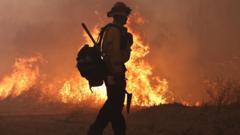As the COP29 conference commenced, US special envoy John Podesta reiterated America's commitment to combating climate change, even in light of Donald Trump's return to the presidency, which many experts expect will hinder climate action efforts. Podesta labeled Trump a climate denier, warning of potential rollbacks of environmental protections and a withdrawal from the Paris Agreement aimed at limiting global temperature rise.
Despite these concerns, Podesta remained optimistic, asserting that "facts were still facts, science is still science," and emphasized that state and city-level initiatives would persist in driving down fossil fuel consumption. “In January, we are going to inaugurate a president whose relationship with climate change is captured by the words ‘hoax’ and ‘fossil fuels’,” Podesta remarked, aligning with concerns that Trump's administration would dismantle established climate policies.
The Paris Agreement, established in 2015, committed nations to efforts to restrict temperature increases to below 1.5° Celsius, a goal now threatened by Trump's administration. With leaders from nearly 100 countries set to address COP29, expectations are tempered as Trump's election leaves Biden administration negotiators in a vulnerable position, unable to deliver significant commitments.
However, Podesta insisted that emissions would likely continue to decline due to previous policies implemented during Biden's tenure. “The fight is bigger than one election, one political cycle and one country,” he declared, highlighting the shared global nature of the climate crisis that transcends political leadership.
This year's COP29 opened amid grim scientific warnings; the UN’s World Meteorological Organization reported that 2024 is projected to be the warmest year recorded. The emission of greenhouse gases and resulting temperature extremes have tangible impacts already affecting countries worldwide, as evidenced by recent climate-related disasters.
Additionally, the need for climate finance for developing nations remains a pressing topic. UN climate change chief Simon Stiell emphasized that two-thirds of the global population cannot afford rapid emissions reductions without financial support, framing climate finance as essential self-interest for wealthier nations.
While discussions around climate initiatives take center stage, the practical challenges faced by delegates, including the high cost of attending the conference, have sparked concerns over the accessibility of such important dialogues. Reports of exorbitant prices for basic necessities at the conference venue underscore the financial strain contributors from less affluent nations experience.
As the climate crisis endures, the outcome of COP29 remains imperative, with the international community seeking collective solutions to a pressing global dilemma, regardless of shifting political landscapes in individual countries.





















